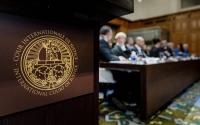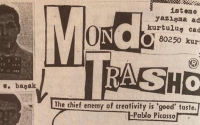Dan PleschThe Observer 26 May 2002
Why Bush's deal with Putin doesn't make the world safer
As President Bush travels around Europe this week, he faces many familiar criticisms of his aggressive stance in international affairs. He hopes to assuage these concerns by concluding new agreements with Russia. But a closer look at these deals shows that they have done little to change the wider Bush approach to international affairs. It is the Republican right's refusal to deal the world in any way beyond insisting that America must have everything it wants which guarantees not just continuing dissent in Europe and beyond, but also a less stable world for American interests.
Let's start with the nuclear arms reduction treaty. Bush has described it as finally ending the Cold War. Of course, the Cold War ended ten years ago with the collapse of the Soviet Union. I still recall the shock that went around the NATO press room as the NATO Secretary General Manfred Worner read out the fax he had just received from President Boris Yeltsin announcing the new Russian Federation.
Of course, George Bush must know this. What he appears to be claiming is that the nuclear confrontation is now also over. But this too is untrue. He has signed a treaty which is said to cut two-thirds of US and Russian nuclear missiles but still keeps thousands ready to fire at a few minutes notice. But this is also a decade-old news. His treaty is similar to the START 2 Treaty signed by his father in 1992. It was never implemented because of opposition in the US Senate from those Republicans than now make up Bush's administration. This latest agreement does not even require the missiles to be destroyed and can be cancelled at ninety days notice.
Bush junior's wing of the Republican Party came to office on a platform of outright rejection of any more nuclear arms treaties with Russia, condemning them as agreements of a byegone age. But after little more than a year they had to concede to Russian insistence that a treaty was essential. In the meantime a decade has been lost that could have been used to manage and eliminate nuclear and other weapons of mass destruction. These weapons are forever being desribed as the greatest threat to peace by world leaders including Blair and Bush. But the problems of proliferation in the third world, of "loose nukes" in Russia and of the continuing US-Russian standoff all remain off the agenda of the Moscow Summit.
In the US, the details of the thousands of Russian weapons and enormous quantities of nuclear materials are publicised by many non-governmental groups anxious. That they be brought under control. Unfortunately they did not even make enough headway when President Clinton was in office. Today their voices fall on deaf ears.
These "loose nukes" and radioactive materials in other nations, including Britain, remain the source fo supply for terrorists and yet Bush is blocking global efforts to control them. The consensus amongst his supporters is that efforts at control are doomed to failure and should never be attempted. Their view is far more extreme even than Ronald Reagan who dealt with the Soviets according the the motto "Trust but Verify". Abandoning these efforts at control is reckless incompetence which his agreement with Putin does little to rectify.
The next order of business for Bush and Putin is a new NATO-Russia agreement. Again, it is certainly better to have some deal that none, but it offers little more than the existing NATO-Russia Permanent Joint Council. This fell into disuse after the Kosovo war. The new agreement calls for cooperaton on counter-terrorism, missile proliferation and missile defence. One result of this new relationship has been that despite Bush's rhetoric on freedom, Russian abuses in Chechnya are no longer criticised by the White House. Even on the spread of missile technology the US has ignored a Russian plan that recommends much greater restrictions than anything NATO has contemplated. Also on Bush's itinerary is a trip to the Normandy beaches where he will attempt to wrap himself in the aura of the many who died there liberating Europe. But Roosevelt and his generation of Americans sought to build the UN and other international insitutions to prevent the renewal of war, Bush on the other hand is bent on belittling the UN and dispensing with international security agreements wherever possible. According to US government officials this refusal to play ball except when they can be guaranteed victory has reached new heights. There is now a formal State Department edict that the US should not even begin a negotiation if it thinks it might have to make concessions. This shows an astonishing lack of confidence in the US's ability to make constructive agreements even when it wields such immense power.
At first sight this strong-minded approach may suit the lone superpower. But any considered view shows that this lack of flexibility and imagination in the application of power has not produced security. Israel is out of control, the Indo-Pakistan conflict has occurred after sanctions caused by the nuclear weapons programmes had been lifted by Washington (in order to bring both South Asian states on board for the war on terrorism); in Afghanistan military victory seems far off and US soldiers keep telling reporters, "It is just like Vietnam". The US military is now advising Bush that despite a near $300 billion budget they cannot attack Iraq for another six months to a year. The militarist culture has yet to face up to the real requirements of intelligence and secrecy. On a recent trip to Washington, talking to experienced writers on American intelligence, I was shown two graphic examples of the failure of the national security culture. On one occasion I was shown pictures of secret Al-Qaeda bases which US soldiers were sending around the internet. On another, pictures of the supposedly secret faces of US commandos taken by a US General on tour and handed out to the public at a special forces museum event back home.
These are not simply isolated lapses but are indicative of a far broader lack of understanding of the real requirements of meeting the threat that certainly does exist from Al Qaeda and its imitators. For the Bush team a military solution is the only solution they are interested in. Nation-building and other "social work" is suitable only for the Europeans. In the real world the military have a role to play but not the only role and on many occasions not even the most important. The Bush approach can be compared to trying to keep law and order just using a riot squad. If the riot squad is all one has, then it will be used more and more. Debate will turn to the need for more and better tear-gas, riot shields and the like. In reality social programs, cops on the beat, economic development and a legal system are essential to our security. Denying that these are essential tools of global governance plays into the hands of the wreckers.
· Dan Plesch is Senior Research Fellow at the Royal United Services Institute and author of Sheriff and Outlaws in the Global Village.






